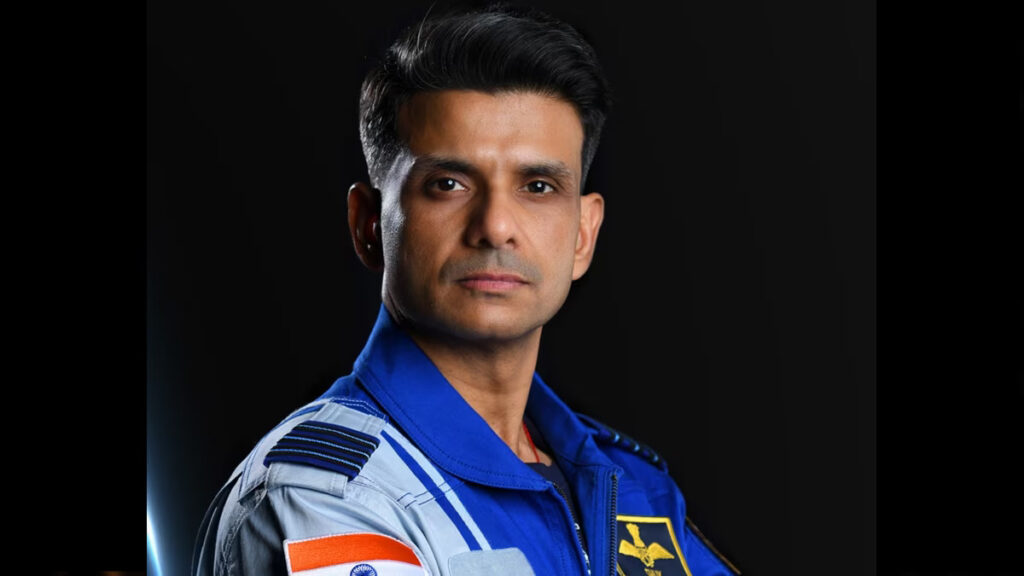Group Captain Sudhanshu Shukla of the Indian Air Force etched his name in history on June 25 by becoming the first Indian in four decades to journey to the International Space Station (ISS). Aboard the SpaceX Dragon spacecraft, launched as part of the Axiom-4 mission, Shukla’s voyage revives India’s human spaceflight legacy last witnessed with Rakesh Sharma in 1984.
The launch at 12:01 pm IST marked a milestone for India’s space aspirations. It reflects a growing collaboration between Indian defence personnel and the global private space ecosystem, particularly with SpaceX and Axiom Space. The mission carried four astronauts, with Shukla representing India’s first presence at the orbital outpost in nearly forty years. Shukla’s selection followed intense training in Russia and the United States. The Group Captain, a decorated pilot, was prepped extensively in ISS protocols, microgravity operations, and safety modules, preparing him for complex roles aboard the station.
In an emotional message posted on Instagram a day before the mission, Shukla reflected on the journey that brought him to this defining moment. He wrote, “As we plan to leave the planet early morning of 25 Jun, I wish to thank everyone who has been involved in this mission for their support and also to all the people back home for their blessings and love.” The post resonated widely, particularly for its candid gratitude. Shukla continued, “Sometimes your close ones make sacrifices that you do not even fully understand but they do so out of their love for you.” A deeply personal note was addressed to his partner Kamna Shubha: “Without you none of this was possible but more importantly none of this would matter.” He concluded powerfully, “No one travels to space alone.”
The mission has sparked pride and admiration across India. Officials from the Ministry of Defence and the Department of Space hailed it as a powerful symbol of India’s readiness to step into the future of human spaceflight. One senior official called Shukla’s journey a “strategic and emotional milestone that will inspire generations.” India’s own Gaganyaan mission is still in the pipeline, and Shukla’s presence aboard a commercial spaceflight is a clear signal of intent. It underlines India’s interest in both public and private sector collaboration to expand its footprint in human space exploration.
Shukla is scheduled to spend approximately a week at the ISS conducting research, particularly in biomedical sciences including cardiovascular responses in space. The work is being carried out in partnership with Indian and global institutions and is expected to contribute valuable data to future long-duration missions. Aerospace analysts have emphasised that his selection by a global private space company reflects the quality of India’s military aviation training. “This mission is a strong vote of confidence in India’s human capital and space readiness,” said an expert.
The symbolism of returning an Indian to the ISS after 40 years has not been lost on the public. Rakesh Sharma’s 1984 spaceflight via a Soviet Soyuz mission remains a historic moment, remembered fondly across generations. Shukla’s flight renews that emotional legacy for the 21st century. On social media, Shukla’s post and mission have gone viral, galvanising young Indians. Many described the moment as aspirational and emotionally resonant, especially his emphasis on teamwork, family and perseverance. India’s space diplomacy has also evolved in recent years. With growing partnerships involving the United States, Japan, and France, the country is making tangible inroads in global space cooperation. Shukla’s mission is an example of this broader geopolitical alignment, signalling India’s readiness for deeper collaboration in the evolving space economy.
His mission is also significant from a sustainability and inclusivity lens. As space travel becomes a new frontier for science and business, India’s involvement ensures a more equitable global representation. As future commercial stations emerge, India is likely to play an increasingly active role. From every angle—scientific, strategic, emotional—Group Captain Sudhanshu Shukla’s journey marks a turning point. It signals that India is not merely watching the future unfold from Earth, but is participating in shaping it from orbit. As his voice echoes from the ISS, it carries the hopes, pride, and ambition of a nation eager to ascend the frontiers of space once more.
Also Read : Mumbai RIL Builds Massive Green Energy Facility


